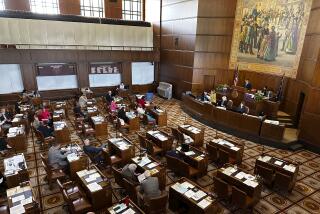Wyden, Smith to Vie for Packwood Seat
PORTLAND, Ore. — In a special primary that also served as a report card on the nation’s first all-mail election for a statewide office, a veteran Democratic congressman and a Republican state legislator won nomination Tuesday to face off for the seat of disgraced former Sen. Bob Packwood.
With about 80% of the vote counted, U.S. Rep. Ron Wyden of Portland held a solid lead over House colleague Peter A. DeFazio in the Democratic race.
In the GOP contest, Gordon Smith, president of the state Senate, swamped state school Supt. Norma Paulus and state Labor Commissioner Jack Roberts. Smith, a millionaire businessman who far outspent his foes, was winning about two-thirds of the vote.
The special election was called after Packwood, a Republican, resigned in October over sexual harassment allegations against him. Packwood had held the post since 1968.
The Wyden-Smith matchup in next month’s general election could provide an early test of voter attitudes as the 1996 campaign season begins in earnest.
In his primary campaign, Wyden, 46, presented himself as a compromiser who can get things done in the new reality of a Republican-controlled Senate. Smith, 43, stressed his conservative stands on social and fiscal issues while his two opponents took more moderate stances.
At the least, Smith’s primary victory signals that Oregon’s GOP voters have embraced their national party’s shift to the right after decades of support for the moderate positions espoused by Packwood and Sen. Mark O. Hatfield, also a Republican.
Hatfield announced last week he would not seek reelection to a sixth term next year, meaning a second Senate campaign will get underway in Oregon even as Packwood’s former seat is filled.
Much of the attention surrounding Tuesday’s primary focused on the mail-in process and whether it would work as advertised--increasing voter participation without increasing the risk of voter fraud or diminishing a basic democratic ritual.
By Tuesday night, state election officials estimated that more than 55% of registered Democrats and Republicans had marked and returned ballots. That is a substantial rise from the 43% turnout in Oregon’s last primary balloting in May 1994.
Election officials also had promised a short and efficient election night, and that seemed to be the case. By 8:30 p.m., half an hour after the close of voting, results representing almost 50% of the total vote were announced.
Secretary of State Phil Keisling cautioned that the novelty of the balloting process would account for some of the increase in participation. Still, he enthusiastically endorsed the mail-in method as one that is “enfranchising and empowering” more people in the state.
The Jan. 30 general election also will be conducted by mail. Keisling and several other state officials hope the process will become a permanent feature of Oregon elections.
For the primary, voters in the two major parties got their ballots in the mail three weeks ago. They could mark them and mail them back to county election offices or return them in person to various drop-off sites before 8 p.m. Tuesday.
Most Oregonians interviewed Tuesday praised the mail-in process. “There’s definitely a convenience factor,” said Roger Noah, a Beaverton Republican. He also noted that voting by mail need not alter tradition. “My wife and I marked them separately and sent them in separately. Then we asked each other who we voted for.”
More to Read
Get the L.A. Times Politics newsletter
Deeply reported insights into legislation, politics and policy from Sacramento, Washington and beyond. In your inbox three times per week.
You may occasionally receive promotional content from the Los Angeles Times.










